已打印高一英语必修1 Unit1 Section Ⅳ Grammar & Writing测试题
高一英语必修一语法归纳
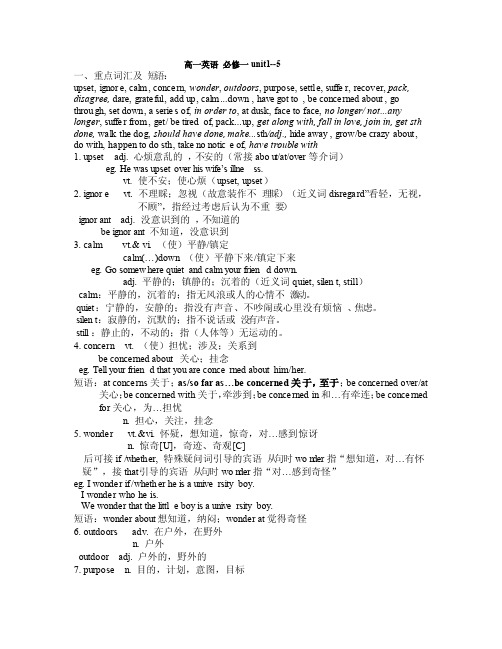
高一英语必修一 unit1--5一、重点词汇及短语:upset, ignore, calm, concer n, wonder, outdoo rs, purpos e, settle, suffer, recove r, pack, disagr ee, dare, gratef ul, add up, calm...down , have got to , be concer ned about, gothroug h, set down, a series of, in orderto, at dusk, face to face, no longer/ not...any longer, suffer from, get/ be tiredof, pack...up, get alongwith, fall in love, join in, get sth done, walk the dog, should have done, make...sth/adj., hide away, grow/be crazyabout, do with, happen to do sth, take no notice of, have troubl e with1. upsetadj. 心烦意乱的,不安的(常接abou t/at/over等介词)eg. He was upsetoverhiswife‘sillnes s.vt. 使不安;使心烦(upset, upset)2. ignore vt. 不理睬;忽视(故意装作不理睬)(近义词disregar d‖看轻,无视,不顾‖,指经过考虑后认为不重要)ignora nt adj. 没意识到的,不知道的be ignora nt 不知道,没意识到3. calm vt.& vi. (使)平静/镇定calm(…)down(使)平静下来/镇定下来eg. Go somewh ere quietand calm your friend down.adj. 平静的;镇静的;沉着的(近义词quiet, silent, still)calm:平静的,沉着的;指无风浪或人的心情不激动。
译林版高一英语必修第一册(2019版)_Unit1_Grammar_and_usage_课后习题
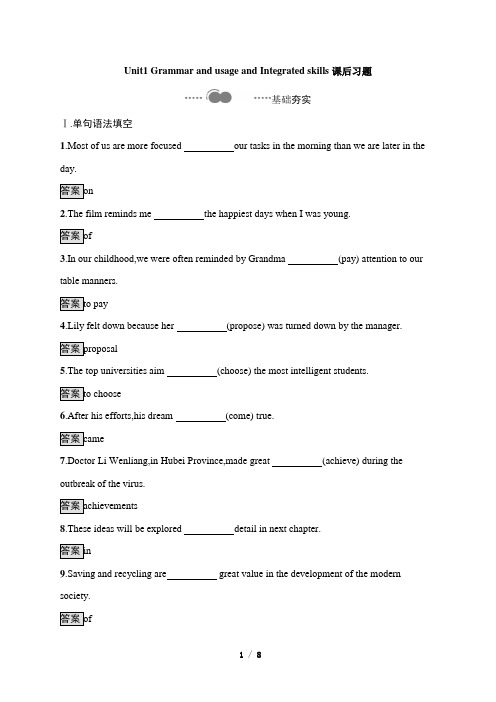
Unit1 Grammar and usage and Integrated skills 课后习题基础夯实Ⅰ.单句语法填空1.Most of us are more focused our tasks in the morning than we are later in the day.2.The film reminds me the happiest days when I was young.3.In our childhood,we were often reminded by Grandma (pay) attention to our table manners.4.Lily felt down because her (propose) was turned down by the manager.5.The top universities aim (choose) the most intelligent students.6.After his efforts,his dream (come) true.7.Doctor Li Wenliang,in Hubei Province,made great (achieve) during the outbreak of the virus.8.These ideas will be explored detail in next chapter.9.Saving and recycling are great value in the development of the modern society.10.If you follow me,you will make greater (succeed).11.(profession)spent more time on the research.12.They asked me to design a (post) for the activity.Ⅱ.短语填空1. the heavy rain,the football match was put off.2.After his retirement,he can his personal interests.3.Whatever happens,we’ll our promise.4.His dream of becoming a university teacher has .5.You’ll be able to choose a room your own personal taste.6.Even if the child’s access to schooling is difficult,you should not .7.To our satisfaction,his efforts on his children will .8.We to be there around six.Ⅲ.完成句子1.他们成功地克服了各种困难。
高一英语必修一-人教版Section Ⅳ Grammar — 直接引语与间接引语(Ⅱ)—祈使句

Section ⅣGrammar —直接引语与间接引语(Ⅱ)—祈使句[新知导引]1.(教材P12)“Look at this example,” the teacher said to us.→The teacher told_us_to_look at that example.2.(教材P12)“Would you like to see my flat?” she asked.→She asked_me_to_see_her flat.3.“Don't look out of the window, boys,” said the teacher.→The teacher told_the_boys_not_to_look out of the window.4.He said, “How clever the child is!”→He said_how clever the child was.[语法详解]1.祈使句的直接引语变间接引语,祈使句的间接引语形式多采用“动词+宾语+动词不定式”结构。
常见的引述动词有ask, tell, beg, warn, remind, advise, order等。
引述表示警告或提醒的祈使句用remind, warn等词转述。
*“Take an umbrella in case of rain.”his mother said to him.→His mother reminded him to take an umbrella in case of rain.*The leader said to the workers, “Don't speak while working.”→The leader warned the workers not to speak while working.[名师点津](1)无论是否定祈使句,还是表示委婉语气的否定疑问句,在变为间接引语时,要用不定式的否定形式:①引述表示命令的祈使句,变间接引语时常采用ask/tell/order sb.(not) to do sth.的形式。
高一英语必修一Unit1Grammar语法直接引语间接引语
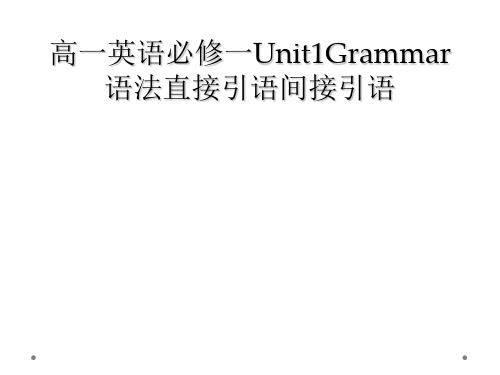
仍用一般现在时。例如: Teacher said to us:" The moon moves round
the earth." Teacher told us the moon moves round the earth. The teacher said to us : “Light travels faster
宾语从句
判断以下哪些句子属于间接引语
She said that she didn’t want to be a teacher. 间接 She said, “I don’t want to be a teacher〞.直接 He said, “ I like playing football〞. 直接 He said that he liked playing football. 间接
3. Mr Black said, “I have walked a long way this week.〞 Mr Black said that __ a long way __. A. I had walked…last week B. he had walked…that week C. I walked…last week D. he has walked…this week
〞 • 间接引语 Mum told me that I could clean my bedroom the next day . • Mr. Smith said,“He is a good worker. ’’ • Mr. Smith said that he was a good worker.
3.人称的变化
• 直接引语里的第一人称和第二人称,变间接引语时,人称要做相 应调整。例如:
外研社高一英语必修一Unit4 Period4 Grammar课件

授课教师:
Step 1 Lead-in
Past
Present
In the Future
Step1 Lead-in
share the same__________
two____________
two strangers_________
a_________
Using Language Attributive Clause (1)
Step2 Activity-1
e.g. I like honest friends. e.g. I like friends who are honest.
Step 2 Activity-2 That is the person whom/who/that you want to see.
2) They applaused to the professor whom we visited yesterday.
They applaused to the professor who teaches us.
Step3 Activity-4
Step 3 Activity-5
Good morning, ladies and gentlemen. Today we invite a student from...to tell us something about his/ her story with his/ her friend. Please welcome...!
This is theht yesterday.
I know the man whose daughter is a doctor. 关系代词 人 物
高一英语暑假精品课(译林版2020必修第一册)必修一unit1语法讲解
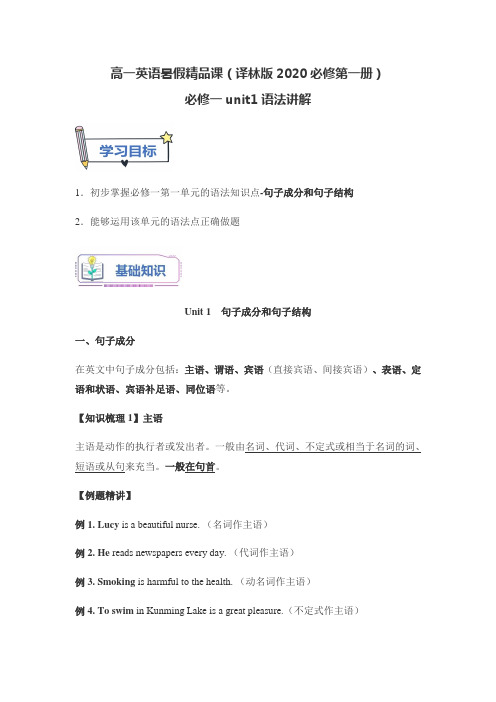
高一英语暑假精品课(译林版2020必修第一册)必修一unit1语法讲解1.初步掌握必修一第一单元的语法知识点-句子成分和句子结构2.能够运用该单元的语法点正确做题Unit 1句子成分和句子结构一、句子成分在英文中句子成分包括:主语、谓语、宾语(直接宾语、间接宾语)、表语、定语和状语、宾语补足语、同位语等。
【知识梳理1】主语主语是动作的执行者或发出者。
一般由名词、代词、不定式或相当于名词的词、短语或从句来充当。
一般在句首。
【例题精讲】例1. Lucy is a beautiful nurse. (名词作主语)例2. He reads newspapers every day. (代词作主语)例3. Smoking is harmful to the health. (动名词作主语)例4. To swim in Kunming Lake is a great pleasure.(不定式作主语)例5. What we should do is not yet decided. (从句作主语)【知识梳理2】谓语说明主语“做什么”,“是什么”或“怎么样”。
谓语必须是动词。
谓语和主语在人称【例题精讲】例1. His parents are teachers. (系动词作谓语)例2. We study hard.(行为动词作谓语)例3. We don’t finish reading the book.(助动词和行为动词一起作谓语)例4. He can speak English. (情态动词和行为动词一起作谓语)【知识梳理3】宾语宾语是动作、行为的承受者,由名词、代词、不定式或相当于名词的词、短语或【例题精讲】例1. She is doing her homework now.(名词作宾语)例2. We often help him.(代词作宾语)例3. He likes to play basketball.(不定式作宾语)例4. We enjoy listening to the music. 我们喜欢听音乐。
译林版高一英语必修第一册(2019版)_Unit1_Grammar_同步练习
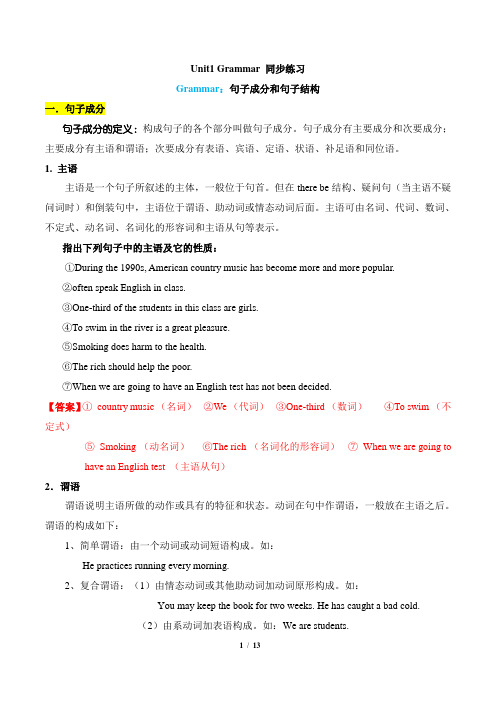
Unit1 Grammar 同步练习Grammar:句子成分和句子结构一.句子成分句子成分的定义:构成句子的各个部分叫做句子成分。
句子成分有主要成分和次要成分;主要成分有主语和谓语;次要成分有表语、宾语、定语、状语、补足语和同位语。
1. 主语主语是一个句子所叙述的主体,一般位于句首。
但在there be结构、疑问句(当主语不疑问词时)和倒装句中,主语位于谓语、助动词或情态动词后面。
主语可由名词、代词、数词、不定式、动名词、名词化的形容词和主语从句等表示。
指出下列句子中的主语及它的性质:①During the 1990s, American country music has become more and more popular.②often speak English in class.③One-third of the students in this class are girls.④To swim in the river is a great pleasure.⑤Smoking does harm to the health.⑥The rich should help the poor.⑦When we are going to have an English test has not been decided.【答案】①country music (名词)②We (代词)③One-third (数词)④To swim (不定式)⑤Smoking (动名词)⑥The rich (名词化的形容词)⑦When we are going tohave an English test (主语从句)2.谓语谓语说明主语所做的动作或具有的特征和状态。
动词在句中作谓语,一般放在主语之后。
谓语的构成如下:1、简单谓语:由一个动词或动词短语构成。
如:He practices running every morning.2、复合谓语:(1)由情态动词或其他助动词加动词原形构成。
高中英语:Unit 1 Section Ⅳ Word含答案
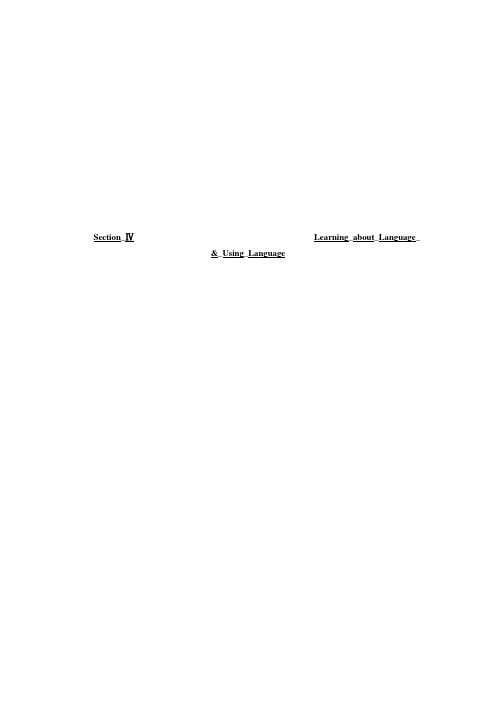
Section_ⅣLearning_about_Language_&_Using_Language[原文呈现] [读文清障] Dear Miss Wang,I am having some trouble with① my classmates at the moment②. I'm getting along well with③a boy in my class. We often do homework together and we enjoy helping each other. We have become really good friends. But other students have started gossiping④. They say that this boy and I have fallen in love⑤. This has made me angry⑥. I don't want to end the friendship, but I hate others gossiping⑦. What should I do?Yours,Lisa①have trouble with与……有麻烦trouble为不可数名词,此处可换为difficulty。
②at the moment此时;此刻;目前③get along with与……相处;进展表示“与……相处得好”用get along well with④gossip ['ɡɒs Ip]v i.&n.闲话;闲谈⑤fall in love相爱;爱上(表动作)be in love相爱(表状态)⑥make sb. angry使某人生气⑦others gossiping为动名词的复合结构,作hate的宾语。
[上方书信译文]亲爱的王小姐:目前,我和同学们(相处)有些麻烦。
我与班里的一位男同学一直相处得很好。
2019-2020年人教新课标高中英语必修一讲义:Unit+1+Friendship+1.4及答案
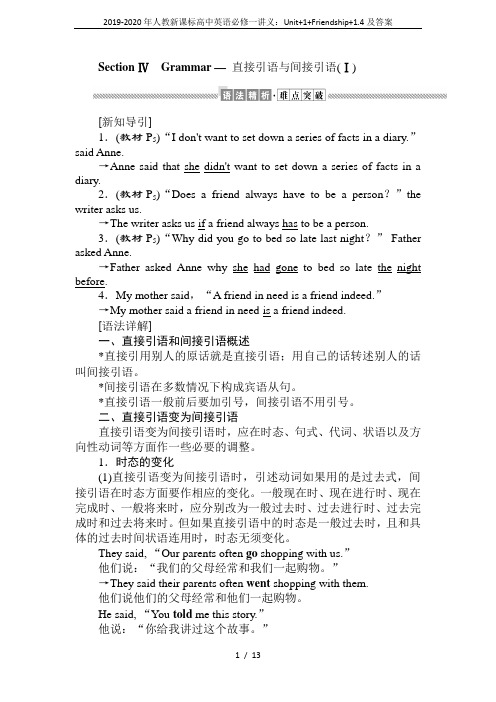
Section ⅣGrammar —直接引语与间接引语(Ⅰ)[新知导引]1.(教材P5)“I don't want to set down a series of facts in a diary.”said Anne.→Anne said that she didn't want to set down a series of facts in a diary.2.(教材P5)“Does a friend always have to be a person?”the writer asks us.→The writer asks us if a friend always has to be a person.3.(教材P5)“Why did you go to bed so late last night?” Father asked Anne.→Father asked Anne why she had gone to bed so late the night before.4.My mother said,“A friend in need is a friend indeed.”→My mother said a friend in need is a friend indeed.[语法详解]一、直接引语和间接引语概述*直接引用别人的原话就是直接引语;用自己的话转述别人的话叫间接引语。
*间接引语在多数情况下构成宾语从句。
*直接引语一般前后要加引号,间接引语不用引号。
二、直接引语变为间接引语直接引语变为间接引语时,应在时态、句式、代词、状语以及方向性动词等方面作一些必要的调整。
1.时态的变化(1)直接引语变为间接引语时,引述动词如果用的是过去式,间接引语在时态方面要作相应的变化。
一般现在时、现在进行时、现在完成时、一般将来时,应分别改为一般过去时、过去进行时、过去完成时和过去将来时。
高一英语必修一unit1知识点

高一英语必修一unit1知识点高中英语必修一Unit 1 知识点梳理一、词汇与短语1. 形容词与副词- 形容词用于描述名词的特征或属性,如:beautiful, interesting, difficult。
- 副词用来修饰动词、形容词或其他副词,表达方式、程度、时间等,如:quickly, usually, very。
2. 常用短语- as soon as possible:尽快地- as…as:和…一样- take place:发生- in order to:为了- be full of:充满- be strict with:对…严格- look forward to:期待二、语法点1. 比较级和最高级- 形容词和副词的比较级和最高级的构成规则,以及它们的基本用法。
- 比较级用于比较两者,最高级用于比较三者以上。
2. 现在完成时- 现在完成时的构成:助动词have/has + 过去分词。
- 现在完成时表示过去发生的动作对现在造成的影响或结果,或者从过去开始一直持续到现在的动作。
3. 一般现在时- 一般现在时的构成:主语 + 动词原形/第三人称单数形式。
- 一般现在时用于描述经常发生的动作、习惯、事实或状态。
三、阅读理解技巧1. 快速浏览(Skimming)- 快速浏览文章,抓住文章的主旨大意。
- 通过标题、图片、段落首句和尾句等信息进行判断。
2. 寻找主题句- 主题句通常位于段落的开头,概括了该段落的主要内容。
- 通过主题句可以更好地理解段落的核心思想。
3. 推理判断- 根据上下文线索,推断生词或难句的意思。
- 通过逻辑关系和文章结构进行推理。
四、写作技巧1. 开头引入- 使用引人入胜的开头,如引用名言、提出问题或描述一个场景。
- 开头应简洁明了,直接引入文章主题。
2. 正文论述- 按照逻辑顺序组织文章,每个段落只讨论一个中心点。
- 使用恰当的连接词,使文章结构清晰,逻辑性强。
3. 结尾总结- 总结文章的主要观点,重申文章的中心思想。
2019-2020学年人教版英语必修1Section Ⅳ Grammar

Unit 5 Nelson Mandela—a modern hero
关系副词引导的定语从句
关系副词 when where why
关系副词的指代及功能 先行词
表示时间的名词 表示地点的名词
reason
功能 时间状语 地点状语 原因状语
栏目 导引
Unit 5 Nelson Mandela—a modern hero
栏目 导引
Unit 5 Nelson Mandela—a modern hero
2.关系副词 where 引导定语从句时,先行词应是表示地点或抽 象地点的名词,关系词在从句中作地点状语。 ◆I’d like to live in the house where there is plenty of sunshine. 我喜欢住在那个阳光充足的房子里。 ◆The house where I lived ten years ago has been pulled down. 我十年前居住的那所房子已经被拆了。
栏目 导引
Unit 5 Nelson Mandela—a modern hero
在定语从句中,有一些含介词的动词短语不可拆开使用,如 look after, look for 等不能把介词移至 which 或 whom 之前。 ◆ The babies whom the nurses are looking after are very healthy.(正) ◆ The babies after whom the nurses are looking are very healthy.(误)
栏目 导引
Unit 5 Nelson Mandela—a modern hero
3.根据句子的意思来选择。 ◆My computer, without which I can’t surf the Internet,broke down yesterday. 昨天我的电脑坏了,没有它我不能网上冲浪。 4.表示“所有”关系或“整体中的一部分”时,通常用介词 of。 ◆I have ten books, half of which were written by Mo Yan. 我有 10 本书,其中一半是莫言写的。 ◆The old man has two sons, both of whom are lawyers. 这位老人有两个儿子,他们都是律师。
人教版英语必修1(课件+教师用书+检测)Unit 1 FriendshipSection Ⅳ Grammar
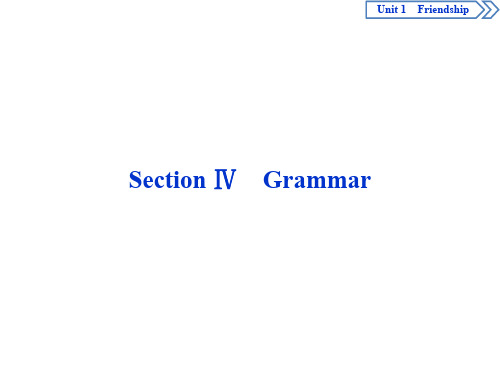
栏目 导引
Unit 1 Friendship
引语 用词
直接引语
tomorrow 明天
时间状语
yesterday 昨天 last night 昨天晚上
the day before yesterday 前天
间接引语
the next/following day 第二天
the day before 前一天 the night before 前一天晚上
two days before 两天前
栏目 导引
Unit 1 Friendship
引语 用词
直接引语
间接引语
three days ago 三天前 three days before 三天前
时间状语
next week 下一周
the next/following week 第二周
地点状语 方向性动词
ago(至今)以前 here 这儿 bring 带来 come 来
Unit 1 Friendship
Section Ⅳ Grammar
Unit 1 Friendship
直接引语和间接引语(Ⅰ)
1.(教材 P5)“I don’t want to set down a series of facts in a diary,” said Anne. →Anne said that __sh_e__d_i_d_n_’t__ want to set down a series of facts in a diary. 2.(教材 P5)“Does a friend always have to be a person?” the writer asks us. →The writer asks us _i_f _ a friend always _h_a_s_ to be a person.
高中英语 Unit 1 Section Ⅳ Grammar & Writinh课件 新人教版选修6
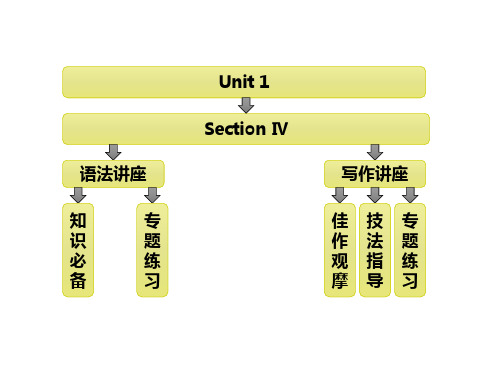
备注:与过去事实相反的虚拟语气,将在第二单元中细讲,
此处只列出
(1)与现在事实相反
If I were you, I would tell him the good news. 要是我是你,我就会告诉他这个好消息。 If we had time now, we should read it again. 要是现
[考题印证2] (2011· 北京高考)— Where are the children? The dinner’s
going to be completely ruined.
—I wish they________ always late. A.weren’t C.wouldn’t be B.hadn’t been D.wouldn’t have been
Unit 1 Section Ⅳ 语法讲座 知 识 必 备 专 题 练 习 写作讲座 佳 作 观 摩 技 法 指 导 专 题 练 习
虚拟语气(Ⅰ)
一、虚拟语气的概念
虚拟语气是谓语动词的一种形式,表示说的话不是事实, 或者是不可能发生的情况,而是一种愿望、建议或与事 实相反的假设。 If I were a bird, I could fly in the air. 如果我是一只鸟,我就能在空中飞行。
[点津] 当insist表示“坚持认为;坚持说”,suggest表示 “表明;暗示”时,后面的宾语从句不用虚拟语气。
He insisted that he had done nothing wrong.
他坚持说他没有做错。 The smile on his face suggested that he was satisfied with our work. 他脸上的笑容表明他对我们的工作很满意。
高一英语人教课标必修1unit1语法——直接引语和间接引语素材

4. The man thought, “I shall take it back tomorrow.” The man thought that __ take it back ____. A. I shall…tomorrow B. I shall…the next day C. he should…tomorrow D. he would …the next day
She said that she hadn’t seen her that day.
④直接引语如果是祈使句,间接引语应改为“ Tell (ask, order, beg等) sb (not) to do sth.”句型 。 如:
1."Don't make any noise," the teacher said to the students. →She told (ordered) the students not to make any noi se. 2.“Open the door, please," said she. →She asked him to open the door.
⑤直接引语如果是以“Let's”开头的祈使句,变为间 接引语时,通常用“suggest +动名词(或从句)” 如: He said, "Let's go to the movies."
→He suggested going to the movies. 或He suggested that they should go to see the movies.
3. 直接引语是特殊疑问句,变为间接引语 引导词为: 特殊疑问词 语序: 陈述(即主语在前,谓语在后)
高中新教材英语课件选择性必修第一册Body LanguagSectionⅣWriting

compound sentences, etc., to enhance the richness and accuracy
of language expression.
03
Rhetorical devices
Using metaphors, personification, and other rhetorical devices
related to body language, such as structure, social expression,
and post.
02
Sentence features
Using multiple sentence structures, including simple sentences,
Revision and polishing
Revise and polish the initial draft, check grammar, spelling, and other errors to ensure the quality of the article.
Writing precautions
Teaching Focus and Difficulties
Teaching focus
Guide students to think deeply about body language and learn to express their opinions and opinions in English; Assist students in mastering vocabulary and expressions related to body language.
- 1、下载文档前请自行甄别文档内容的完整性,平台不提供额外的编辑、内容补充、找答案等附加服务。
- 2、"仅部分预览"的文档,不可在线预览部分如存在完整性等问题,可反馈申请退款(可完整预览的文档不适用该条件!)。
- 3、如文档侵犯您的权益,请联系客服反馈,我们会尽快为您处理(人工客服工作时间:9:00-18:30)。
高一英语必修1 Unit1 Section ⅣGrammar & Writing测试Ⅰ.句型转换1.“I am repairing my bike,”Jack said.→Jack said________ ________ ________ repairing________bike.2.“Is your son going to Shanghai tomorrow?”Tom asked me.→Tom ask ed me____ ____ ________ ________ ________going to Shanghai________ ________ _____ ___.3.“Y ou have finished your homework,haven’t you?”my mother asked.→My m other asked me________ ________ ________ finished my homework.4.Mum said to me,“You’d better see your grandparents this afternoon.”→Mum told me that I had better see________ grandparents________ ________.5.He asked me what I was doing when Fred went in.→He asked,“What________ ________ ________ when Fred________ ________?”6.I told him that I had lost my purse and that I would try to find it.→I said to him,“I________ ________my purse and I________try to find it.”7.Susan asked her husband how much they had spent on food that year.→“How much________ ________ spent on food________ ________?”Susan asked her husband.8.He told me that he had left for London before I had emailed him.→He said to me,“________ ________ ________ for London before________ ________ ________.”Ⅱ.完成句子1.那个人问他是应该等着他们还是应该继续走。
The man asked_______ _he should wait for them________go on。
2.物理老师告诉过我们说光比声音传得快。
Our physics teacher told us that light________ ________ than sound.3.那个妇女问我她怎么去车站。
The woman asked me________ ________ ________get to the stat ion.4.校长问我叫什么名字?The headmaster asked ________ ________ ________ ________.5.他问我是否知道怎样去图书馆。
He ________ ________ ________ I knew how to get to the library.Ⅲ.单项填空1.The nurse told the children that the sun________in the east.A.risen B.roseC.rises D.rising2.“I can help you with your English tomorrow,”my English teacher said.→My English teacher said________.A.I can help you with your English tomorrowB.he could help me with my English the next dayC.I could help you with your English the following dayD.he can help me with my English tomorrow3.My cousin told me he________a concert________.A.had been to;three days beforeB.went to;a week beforeC.would go to;since a week agoD.was going to;for a week4.Joan asked me________to visit her grandma with her.A.whether would I like B.if would I likeC.whether I would like D.when would I like5.The little girl told him that she had watched the wonderful football match________. A.today B.tomorroC.the month before D.the next month6.He said,“What’s the matter?”→He asked________.A.what the matter is B.what the matter wasC.what is the matter D.what was the matter7.“Have you see the film?”he asked me.→He asked me________.A.had I seen the filmB.have I seen the filmC.if I have seen the filmD.whet her I had seen the film8.The teacher told the students that there________a meeting at three o’clock. A.were going to have B.is going to beC.will be D.was going to be9.After the examina tion,my teacher told me that failure________the mother of success. A.was B.isC.be D.been10.—What did the foreigner say?—Oh,he asked where________.A.did Jim come from B.Jim came fromC.Jim comes from D.does Jim come from参考答案:Ⅰ.句型转换:1.答案:that he was;his2.答案:whether/if my son was;the next following day3.答案:whether/if I had4.答案:my;that afternoon5.答案:I had left;you emailed me6.答案:have lost;will7.答案:have we;this year 8.答案:were you doing;came inⅡ.完成句子1.答案:asked me if/whether2.答案:travels faster3.答案:how she could4.答案:what my name was5.答案:whether;orⅢ.单项填空1.解析:选C。
直接引语如果表达的是客观真理、谚语,变成间接引语时,时态不变,仍用一般现在时。
2.解析:选B。
本题考查直接引语变间接引语。
要根据语境进行人称和物主代词的变化,本句中,I→he;you→me;your→my;间接引语中的时态要与主句的时态保持一致(这里要把can变为could);tomorrow变为the next da y/the following day。
3.解析:选A。
本题考查间接引语。
根据直接引语变间接引语时时态一致的原则和时间状语的变化,A为正确答案。
4.解析:选C。
asked后接间接引语,间接引语应该用陈述句语序。
5.解析:选C。
told后是一个间接引语,时态是过去完成时,因此时间状语不可能是A、B 或D,因为将来时间状语要用过去将来时。
6.解析:选D。
what’s the matter是一个陈述句语序的句子,在变成间接引语时,语序不变,只改变时态。
7.解析:选D。
此题考查直接引语变间接引语。
根据语序变化规则,排除A、B两项,根据时态变化,只有D项正确。
8.解析:选D。
主句为一般过去时,在间接引语中,要用过去将来时态。
而且a meeting为单数,因此用was going to be。
9.解析:选B。
表示“真理,事实”的直接引语变为间接引语时,时态不变。
10.解析:选B。
直接引语是疑问句,变为间接引语时,要把疑问句语序变为陈述句语序,主语的人称、时态等也要作相应的变化。
